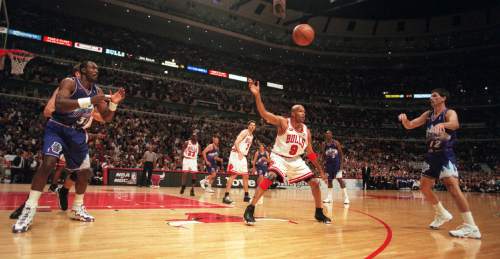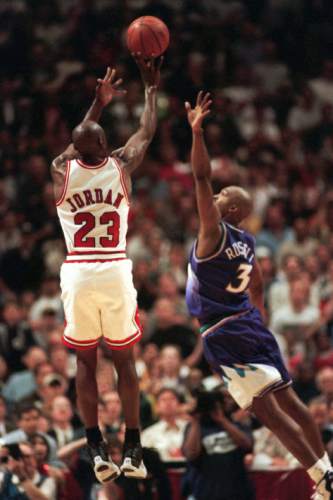This is an archived article that was published on sltrib.com in 2016, and information in the article may be outdated. It is provided only for personal research purposes and may not be reprinted.
Every graybeard basketball player on the planet is piping in on the debate regarding how good or not good Golden State was this past season. Despite losing in the NBA Finals in seven games, the Warriors set a record for regular-season wins with 73.
The latest is former Jazz player Bryon Russell, who, as noted in The Tribune, said during a recent radio interview that Steph Curry's guys not only couldn't defeat Michael Jordan's Bulls, they couldn't beat John Stockton's 1997-98 Jazz.
His exact words:
"Everybody is always comparing the Golden State Warriors to the Chicago Bulls: 'Can they beat 'em?' They couldn't beat the Bulls in any era. Matter of fact, they couldn't even beat the Utah Jazz team I played on in any era because we had this one big guy down in the post named Karl Malone. Who you going to put on him? Draymond [Green]? Andrew Bogut? Please don't say Festus Ezeli. Who's going to guard me, to be honest? I'll post up Klay [Thompson] or [Steph] Curry. And I pretty much consider myself having some good defense."
Before examining Russell's claim, it must be stated that such comparisons are always flawed. There's no exactness to them. It's nothing more than a judgment call. But we'll do it, anyway, because it's irresistible. Especially when a player like Russell boasts about what he would have done to a team that had won an NBA title and lost to LeBron's Cavs in defending that crown.
How many titles did the Jazz win with Russell?
Ouch.
Too soon? Yeah, probably.
But, then, Russell would say the only reason the Jazz don't have a ring is because of the greatness of Jordan, ignoring the two years the Jazz had a shot at a title when Jordan played baseball and fell to Houston both times. He likely would say those teams were superior to the Warriors, too.
Let's examine his claim, player by player, position by position.
Point guard: Stockton/Curry • A lot of folks around here would automatically — and incorrectly — give Stockton the edge. They would be right, perhaps, if the totality of their careers were considered. But in sizing up the showing Stockton had in '97-'98 against Curry's performance this past season, it's a different story.
Stockton: 12 points, 8.5 assists, 2.5 turnovers.
Curry: 30.1 points, 6.7 assists, 3.3 turnovers.
Advantage Curry.
Shooting guard: Jeff Hornacek/Klay Thompson • Hornacek was a terrific shooter who often got lost in Jerry Sloan's layup-first offense. He was a crafty passer who often set up his teammates with the pass that led to the pass that led to a basket. He tried to play defense, but, by that time, was dragging one of his legs around the floor, gutting it up. Thompson not only scored, he often was assigned defensively to the opponent's best guard.
Hornacek: 14.2 points, 4.4 assists, 3.4 rebounds.
Thompson: 22.1 points, 2.1 assists, 3.8 rebounds.
Advantage Thompson.
Small forward: Russell/Harrison Barnes • Both of these forwards were sidecar players counted on to hit the occasional open shot, usually created because defenses were preoccupied with stopping bigger offensive threats. Malone used to say the Jazz would only go as far as Russell would take them because he was an X-factor, an X-factor who often didn't pull through well enough. Russell's claim to fame is the infamous play when Jordan pushed him away to hit the Game 6-winner to clinch another title. His defense was solid, not exceptional.
Russell: 9 points, 4 rebounds, 1.2 assists.
Barnes: 11.7 points, 4.9 rebounds, 1.8 assists.
Advantage Barnes.
Power forward: Malone/Draymond Green • Malone was an all-time great, and he was in great form in '97-98. Like Russell said, he would have been a difficult matchup for Green, who is a top defender. That would have been fun to watch. But even with Green's advanced versatility at both ends, Malone would have been a force. And kicking him in the tenders would only have ticked Karl off even more.
Malone: 27 points, 10.3 rebounds, 3.9 assists.
Green: 14 points, 9.5 rebounds, 7.4 assists.
Advantage Malone.
Center: Greg Ostertag/Andrew Bogut • Ostertag was only a part-time starter, but he and Bogut played about the same amount of minutes (20) per game. Their stats were comparable. Each was primarily a defensive presence, but Bogut was by far the superior passer and never professed to have been kidnapped by aliens.
Ostertag: 4.7 points, 5.9 rebounds, 2.1 blocks.
Bogut: 5.4 points, 7 rebounds, 1.6 blocks.
Advantage Bogut.
Extraneous: Andre Iguodala/Adam Keefe • Iguodala was coming off his performance as the Finals MVP, and averaged 26 minutes. Keefe, who started some games, was a plow horse, averaging about the same amount of floor time. Iguodala was a veteran leader, a calming influence, and a strong defender. Keefe hustled real hard.
Iguodala: 7 points, 4 rebounds, 3.4 assists.
Keefe: 7.8 points, 5.5 rebounds, 1.1 assists.
Advantage Iguodala.
There were other bits and pieces to both teams, including Antoine Carr, Shandon Anderson, Howard Eisley for the Jazz and Shaun Livingston and Leandro Barbosa for the Warriors. The Jazz finished 60-22 in '97-98, the Warriors 73-9. Both teams lost in the Finals — to teams led by the best players of their generations: MJ and LeBron.
All things considered, regardless of what old-timers say about '90s basketball being better than the ball played now, I'd say B-Russ is wrong. Who really knows? The problem with coming to that conclusion is, it sounds like a putdown. It's not. A couple of those Jazz teams were fantastic. But you'd have to use the same designation for a Warriors team that broke the regular-season record, and, then, could not defend its title. But at least it had a title to defend.
I know, I know, still too soon.
GORDON MONSON hosts "The Big Show" with Spence Checketts weekdays from 3-7 p.m. on 97.5 FM and 1280 AM The Zone. Twitter: @GordonMonson.





